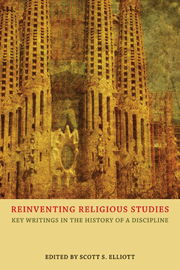Book contents
- Frontmatter
- Contents
- Introduction
- 1 For such a time as this: the Council of Societies for the Study of Religion, 1969–2009
- Part I Inventing and reinventing the field of religious studies
- Part II Method and theory in religious studies
- Part III Teaching religion
- Part IV Women and the bible in religious studies
- Part V Religion and religious studies in civic life
- 24 Contemporary socio-political change and the work of religious studies
- 25 The scholar of religion as a cultural critic: perspectives from Denmark
- 26 What are the humanities and why do they matter? The case of religion and public life
- 27 Response to Gary Lease's “What are the humanities, and why do they matter?”
- 28 So, what are we professing here? Religion, the liberal arts, and civic life
- 29 Response to Raymond B. Williams's “So, what are we professing here? Religion, the liberal arts, and civic life”
- 30 Response to Raymond B. Williams's “So, what are we professing here? Religion, the liberal arts, and civic life”
- 31 Response to Raymond B. Williams's “So, what are we professing here? Religion, the liberal arts, and civic life”
- 32 Rejoinder
- Part VI Religious studies and identity politics
- Part VII Islam and 9/11
- Bibliography
- Acknowledgments
- Index
25 - The scholar of religion as a cultural critic: perspectives from Denmark
from Part V - Religion and religious studies in civic life
- Frontmatter
- Contents
- Introduction
- 1 For such a time as this: the Council of Societies for the Study of Religion, 1969–2009
- Part I Inventing and reinventing the field of religious studies
- Part II Method and theory in religious studies
- Part III Teaching religion
- Part IV Women and the bible in religious studies
- Part V Religion and religious studies in civic life
- 24 Contemporary socio-political change and the work of religious studies
- 25 The scholar of religion as a cultural critic: perspectives from Denmark
- 26 What are the humanities and why do they matter? The case of religion and public life
- 27 Response to Gary Lease's “What are the humanities, and why do they matter?”
- 28 So, what are we professing here? Religion, the liberal arts, and civic life
- 29 Response to Raymond B. Williams's “So, what are we professing here? Religion, the liberal arts, and civic life”
- 30 Response to Raymond B. Williams's “So, what are we professing here? Religion, the liberal arts, and civic life”
- 31 Response to Raymond B. Williams's “So, what are we professing here? Religion, the liberal arts, and civic life”
- 32 Rejoinder
- Part VI Religious studies and identity politics
- Part VII Islam and 9/11
- Bibliography
- Acknowledgments
- Index
Summary
A recent Bulletin editorial called for a more active role of scholars of religion as engaged, public intellectuals. In the same issue, Warren G. Frisina argues that though we need not all “become like Martin Marty … our fear of popularization, and the ‘pollution’ that attends it, needs to be tempered with an awareness that there can be no more ultimate justification for continuing to support our work than that it is a resource for public discourse about religion.” “It would be nicer,” Frisina concludes, “if we had a few more people within our field with the talent and the energy to communicate what we've learned to a broader audience” (1997: 33). I belong to this “filthy few,” not on the American scene, though, but on the Danish; if not with great talent, then at least with some energy. In spite of the differences between the Danish and American situations, a perspective from over here may be of interest to some of the readers of the Bulletin. For, despite what newspapers and the news on TV suggest, Marty's recent book (1997), Russell McCutcheon's Manufacturing Religion (1997b) as well as his “A Default of Critical Intelligence? The Scholar of Religion as Public Intellectual” (1997a), suggest that the differences are not so big as to prevent comparisons.
- Type
- Chapter
- Information
- Reinventing Religious StudiesKey Writings in the History of a Discipline, pp. 160 - 167Publisher: Acumen PublishingPrint publication year: 2013



